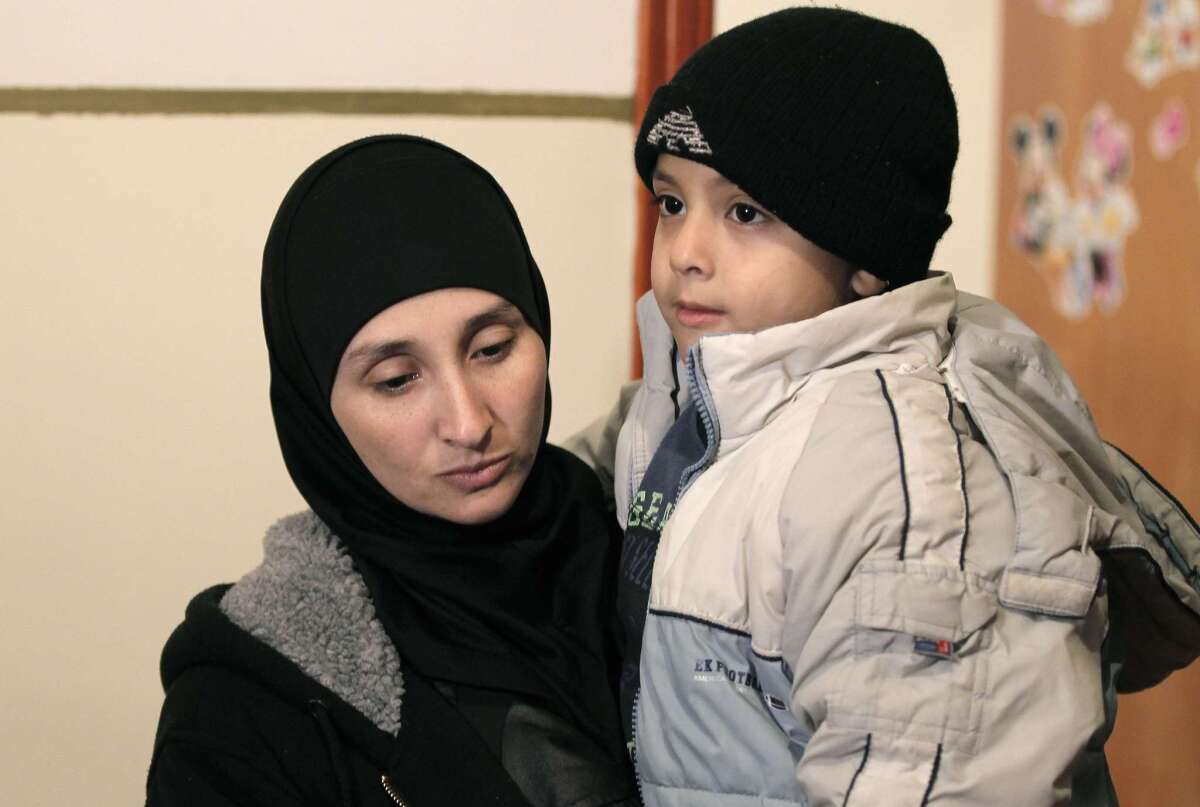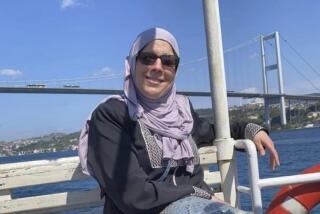Israel strips residence rights for widow of synagogue attacker

A week after Ghassan Abu Jamal took part in an attack that killed five Israelis in a Jerusalem synagogue, Israeli officials announced Wednesday that his widow will be stripped of the permit allowing her residence in Jerusalem and that she’ll be returned to the Palestinian-controlled territories.
The move came as Israeli officials weighed comprehensive legislation with harsh punitive measures against perpetrators of attacks and their families.
------------
For the Record
Nov. 26, 2:20 p.m.: An earlier version of this article incorrectly spelled Israeli lawmaker Yariv Levin’s last name Levine.
------------
In addition to losing the status granted upon her marriage to a Palestinian resident of Jerusalem, Nadia Abu Jamal will forfeit any future benefits the permit affords, such as social insurance and healthcare. It wasn’t immediately clear whether the couple’s three children would retain their rights.
“Anyone involved in terror should take into consideration the possible consequences for his family,” Interior Minister Gilad Erdan said in announcing the measures.
An attorney for Abu Jamal, who is from the West Bank village of Sawahreh, told local media that she had not yet received a formal warrant but would contest the decision in court.
The move is one of several controversial steps that are decried by rights organizations as collective punishment but that Israel argues are deterrents needed to counter attacks that have killed 11 Israelis since the beginning of October.
The piecemeal steps -- which include partially demolishing the home of one Palestinian attacker in Jerusalem and issuing warrants for the demolition of others -- have met with international criticism.
The comprehensive legislation being considered has been described as an eight-step plan to “eradicate terror.” The measure, drafted by lawmaker Yariv Levin at Prime Minister Benjamin Netanyahu’s request, proposes automatically stripping citizenship or residency of individuals convicted of committing or aiding a terror attack; demolishing the perpetrators’ homes within 24 hours, subject to court approval, even if they were killed during or after the attack; and withholding terrorists’ bodies for burial at an undisclosed site off-limits to their families.
The proposal also calls for deporting outside Israeli territory, upon completion of their prison sentence, any citizen or resident convicted of throwing a firebomb or firecracker. It also includes a 10-year suspension of social security rights and drivers’ licenses for those convicted of incitement to terror, throwing rocks or waving enemy flags -- the banner of the Palestinian Authority is specifically mentioned -- at a protest defined as illegal.
The measure is the latest pursued by lawmakers groping for practical tools to crack down on violence against Israel and to punish anyone supporting it, including Arab legislators.
Justice Minister Tzipi Livni temporarily blocked a bill, scheduled for a preliminary vote Wednesday, that would allow lawmakers to eject a fellow member from the Knesset, or parliament, for supporting an armed struggle against Israel.
The immediate target was Haneen Zoaby, a firebrand Arab Israeli lawmaker currently suspended from the parliament after saying she didn’t regard the June kidnapping of three Jewish teenagers in the West Bank as terrorism. She made the statement before their bodies were found.
While those encouraging terror belong in jail, Livni said, such a step is for the courts to decide. She said she would be happy if Zoaby were not reelected but objected to lawmakers in effect firing one another. “This is a dangerous idea,” she said.
However, the most divisive legislation before the Knesset remains the so-called nationality bill, which would promote a constitutional definition of Israel as the nation-state of the Jewish people only.
Raised at a tense juncture in Israeli relations with the Palestinians as well as with the country’s Arab minority, the measure has been criticized by some as a threat to democracy and backed by others as necessary to counter those challenging Israel’s Jewish character from within and without.
Since taking office in 2009, Netanyahu has insisted that the Palestinians recognize Israel as the Jewish homeland as part of any permanent peace agreement, chiefly to negate demands for the return of Palestinian refugees that would change the demographic balance and Israel’s Jewish character.
During a visit to South Africa on Wednesday, Palestinian President Mahmoud Abbas expressed support for those opposing the bill, which could impact chances of achieving peace in the region, according to media reports.
A stormy Knesset debate Wednesday reflected the deep dispute and heightened emotions around the bill, which is threatening to splinter Netanyahu’s ruling coalition and prompt early elections.
Defending the bill he plans to bring to the Cabinet next week, Netanyahu outlined its principles as stating that the right to self-determination in Israel is “exclusive to the Jewish people” and that the Israel is a democracy “which guarantees the personal rights of all its citizens before the law.”
“Now, explain to me why you disagree. Tell me, I want to know,” Netanyahu demanded of shouting lawmakers.
The prime minister also defended Erdan’s decision and legislation to revoke rights of perpetrators or supporters of violence. “Those who praise murderers, calling them martyrs, and incite or commit acts of terror will not receive national insurance,” he said.
Sobelman is a special correspondent.
More to Read
Start your day right
Sign up for Essential California for news, features and recommendations from the L.A. Times and beyond in your inbox six days a week.
You may occasionally receive promotional content from the Los Angeles Times.






